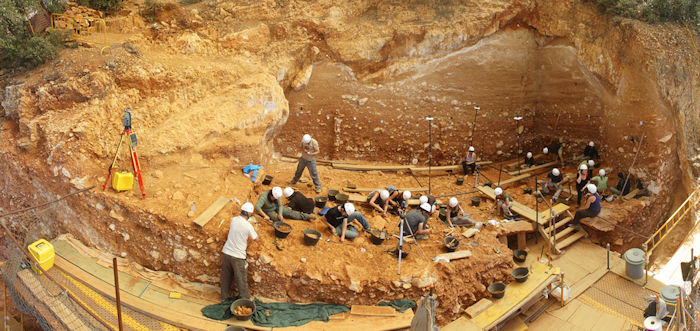Conny Waters – AncientPages.com – Paleontologists may have unearthed the oldest European human fossil to date.
Found at the world-famous Atapuerca prehistoric archaeological site in northern Spain, scientists have described the remarkable discovery as the "face of the first European."
Sierra de Atapuerca. Credit: Mario Modesto Mata - CC BY-SA 2.0
The caves of the Sierra de Atapuerca located near the city of Burgos, in the Autonomous Community of Castilla y León, in the North of the Iberian Peninsula are a treasure trove to paleontologists.
Covering an area of 284.119 ha, the site contains a rich fossil record of the earliest human beings in Europe, from nearly one million years ago and extending into the Common Era. Excavations at the Atapuerca site have offered scientists unique window into the past, and the appearance and way of life of remote human ancestors.
According to recent reports, presented by Spanish paleontologists a fossil found at the Sima del Elefante (Elephant Hill) is around 1.4 million years old.
This is a groundbreaking discovery considering the fact the oldest hominid fossil found in Europe was a jawbone found at the same site in 2007 which was determined to be 1.2 million years old.
Paleontologists have found a human fossil in northern Spain whose age has provisionally been estimated at 1.4 million years. If confirmed, it would be the oldest human fossil ever found in Europe. Credit: Belga
The archaeological team led by Edgar Tellez, a doctoral student at the Spanish National Center for Human Evolution (CENIEH) says the find consists of a cheekbone and a maxilla (upper jaw).
“The bones were officially presented to the public in the city of Burgos by the three co-directors of Atapuerca (Juan Luis Arsuaga, Jose Maria Bermudez de Castro and Eudald Carbonell) as well as by Rosa Huguet, coordinator of the Sima del Elefante site, and Gonzalo Santonja, minister of culture of the Castilla y Leon region,” Xinhua reports.
"This discovery will probably help us to know the species that colonized Europe," Carbonell said, explaining that although there could have been earlier human inhabitants in Europe, they had not established permanent populations.
See also: More Archaeology News
“Arsuaga said the fossil would "force us to rewrite the books on human evolution" as they "push back the human presence in Europe and show us that things we thought appeared at the end of evolution(such as the modern face) arose at the beginning." ■
Written by Conny Waters - AncientPages.com Staff Writer








